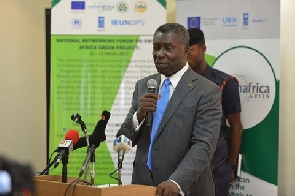 Professor Kwabena Frimpong-Boateng, Minister of Environment, Science, Technology and Innovation
Professor Kwabena Frimpong-Boateng, Minister of Environment, Science, Technology and Innovation
Professor Kwabena Frimpong-Boateng, the Minister of Environment, Science, Technology and Innovation (MESTI), says biodiversity is the country’s heritage and valuable assets for ecological integrity and economic reformation.
He noted that, if biodiversity resources were managed intelligently and properly, they would serve as catalyst for national development and a conduit for poverty alleviation.
Biodiversity is the interactions that often take place among animals, plants, water, air and micro-organisms in their ecological environment.
Prof. Frimpong-Boateng said this in a speech read on his behalf by Madam Salimata Abdul Salam, the Chief Director of MESTI, at the opening of the maiden National Consultative Workshop on Connect Mainstreaming of Biodiversity into the Heart of Government decisions, in Accra.
The three-year project is being funded by the Global Environment Facility with five million dollars.
The United Nations Environmental Programme-World Conservation Monitoring Centre (UNEP-WCMC) is coordinating Ghana, Mozambique, and Uganda to pilot this project. The other partners are International Institute for the Environment and Development (IIED) and Prospex.
The Connect would help achieve sustainable development by bringing biodiversity information to the heart of government decision making processes using actionable biodiversity information.
The project objective is to ensure that biodiversity was taken into account in decision making across government sectors by improving development decision makers’ access to and use of biodiversity information and embedding biodiversity information within national development decision making processes.
The workshop is intended to afford stakeholders the opportunity to validate the project documents, analyse and discuss biodiversity data to improve access and use, as well as undertake political economy analysis of biodiversity ecosystem.
To this end, the project would develop biodiversity information product for each of the pilot countries through demand driven processes that clearly understands the in- country demands for the information as the barriers to using the biodiversity information within government decision making processes, mobilise and repackage biodiversity data and information from a range of sources (national and international to meet the demands identified above and strengthen the connection between decision makers and biodiversity and ecosystem services data providers in order to sustainably provide policy relevant spatially explicit information to meet national needs.
Prof. Frimpong-Boateng said biodiversity was at the heart of ecosystem goods and services, which had significant economic value for livelihoods and poverty reduction.
He said biodiversity mainstreaming into the national development agenda was very crucial in achieving the country’s development objectives and Sustainable Development Goals.
Unfortunately, he said, biodiversity information which was key for national spatial planning and process was not adequately used.
He said the country’s land cover profile was changing rapidly leading to habitat destruction of biodiversity, saying; “The work of the Ghanaian biodiversity into the economy in terms of job creation, incomes, communities, exchange earnings, good forest products, export and protection of the environment has not received the requisite attention”.
He said Ghana’s efforts in the past to ensure sustainable use of biodiversity for national development had been mediocre and often below expectations because much efforts had not been expanded in managing biodiversity for public good.
Prof. Frimpong-Boateng said integrating biodiversity into public and private decision-making and creating the enabling conditions for policy implementation was crucial to address this.
“As a way of giving attention to biodiversity issues, the Ministry developed a National Development Plan in fulfillment of its obligation of the Convention on conservation of biodiversity and developing a National Policy on biodiversity and managing terrestrial and aquatic-biodiversity sustainable and equitable development for all Ghanaians and the future,” he said.
Towards fulfilling the safety of biodiversity, he said, the MESTI had developed a National Action Plan, which would strengthen national biodiversity institutions and developing systems and technologies that would protect the threatened species while promoting the sustainability of the natural environment.
Prof. Frimpong-Boateng said government recognised the significant role of biodiversity to achieve the Sustainable Development Goals and welcomed the appropriate collaboration and interventions.
He commended the United Nations Environmental Programme, the World Conservation Monitoring Centre, UK, and its partners for the support and assured the government’s commitment to implement the Connect Project to the benefit of the Ghanaian.
Mr. Eric Okoree, the Chief Executive Officer of the National Biosafety Authority, in his welcome address, said 98 per cent of human existence on earth depended on biodiversity and therefore, there was the need to have a preferential treatment on the issue in national development agenda.
To ensure the safety of biodiversity, he said, there should be proper regulatory mechanisms and strong institutions to manage it so that the citizenry would be the ultimate beneficiaries.
He entreated the selected stakeholders such as the Minerals Commission, Council for Scientific and Industrial Research, Ghana Statistical Research, National Development Authority, the environmental Protection Agency, among others, to show absolute commitment to achieve the research objectives.
Biodiversity is crucial for human survival and well-being. It is at the foundation of ecosystem goods and services, which have significant economic value for livelihoods and poverty reduction.
Unfortunately biodiversity information, which is a key element in planning, is not adequately used in national planning and development processes.